December 2018: Olive Tree

Volume II/Issue 32/December 2018


From The Editorial Desk:
My Traditional Christmas Story Editorial: The Three Trees
Almost every year at Christmas, when my brother and I were growing up, my mother would tell this story about the Three Trees . I thought I would share it with you this Christmas. Its not a devotion really, and it is not necessarily profound. But it does have a simple truth that I would like to leave with you:
A Tale of the three trees
Once upon a mountain top, three little trees stood and dreamed of what they wanted to become when they grew up. The first little tree looked up at the stars and said: "I want to hold treasure. I want to be covered with gold and filled with precious stones. I'll be the most beautiful treasure chest in the world! "
The second little tree looked out at the small stream trickling by on its way to the ocean. "I want to be traveling mighty waters and carrying powerful kings. I'll be the strongest ship in the world! "
The third little tree looked down into the valley below where busy men and women worked in a busy town. "I don't want to leave the mountain top at all. I want to grow so tall that when people stop to look at me, they'll raise their eyes to heaven and think of God. I will be the tallest tree in the world!"
Years passed. The rain came, the sun shone, and the little trees grew tall. One day three woodcutters climbed the mountain.
The first woodcutter looked at the first tree and said, "This tree is beautiful. It is perfect for me. With a swoop of his shining axe, the first tree fell. Now I shall be made into a beautiful chest. I shall hold wonderful treasure!", the first tree said.
The second woodcutter looked at the second tree and said, "This tree is strong. It is perfect for me." With a swoop of his shining axe, the second tree fell. "Now I shall sail mighty waters! thought the second tree. I shall be a strong ship for mighty kings!"
The third tree felt her heart sink when the last woodcutter looked her way. She stood straight and tall and pointed bravely to heaven. But the woodcutter never even looked up. Any kind of tree will do for me, he muttered. With a swoop of his shining axe, the third tree fell.
The first tree rejoiced when the woodcutter brought her to a carpenters shop. But the carpenter fashioned the tree into a feedbox for animals. The once beautiful tree was not covered with gold, nor with treasure. She was coated with sawdust and filled with hay for hungry farm animals.
The second tree smiled when the woodcutter took her to a shipyard, but no mighty sailing ship was made that day. Instead, the once strong tree was hammered and sawed into a simple fishing boat. She was too small and too weak to sail on an ocean, or even a river; instead, she was taken to a little lake.
The third tree was confused when the woodcutter cut her into strong beams and left her in a lumberyard. "What happened?", the once tall tree wondered. All I ever wanted was to stay on the mountain top and point to God.
Many, many days and night passed. The three trees nearly forgot their dreams.
But one night, golden starlight poured over the first tree as a young woman placed her newborn baby in the feed box. "I wish I could make a cradle for him", her husband whispered. The mother squeezed his hand and smiled as the starlight shone on the smooth and the sturdy wood. "This manger is beautiful", she said.
And suddenly the first tree knew he was holding the greatest treasure in the world.
One evening a tired traveler and his friends crowded into the old fishing boat. The traveler fell asleep as the second tree quietly sailed out into the lake. Soon a thundering and thrashing storm arose. The little tree shuddered. She knew she did not have the strength to carry so many passengers safely through with the wind and the rain. The tired man awakened. He stood up, stretched out his hand, and said, "Peace." The storm stopped as quickly as it had begun. And suddenly the second tree knew he was carrying the king of heaven and earth.
One Friday morning, the third tree was startled when her beams were yanked from the forgotten woodpile. She flinched as she was carried through an angry jeering crowd. She shuddered when soldiers nailed a mans hands to her. She felt ugly and harsh and cruel. But on Sunday morning, when the sun rose and the earth tremble with joy beneath her, the third tree knew that Gods love had changed everything. It had made the third tree strong. And every time people thought of the third tree, they would think of God. That was better than being the tallest tree in the world.
The next time you feel down because you aren't where you want to be in life, sit tight and be happy because God is thinking of something better for you.
Merry Christmas!

Traveling Home to Heaven
“And each one said to his neighbour: Come, let us make brick, and bake them with fire. And they had brick instead of stones, and slime instead of mortar. And they said: Come, let us make a city and a tower, the top whereof may reach to heaven: and let us make our name famous before we be scattered abroad into all lands.” (Genesis 11:3-4)
We know that God confused the languages to prevent this attempt to circumvent the only way to heaven, living in conformity with His will.
When we plan a trip from one place to another, we decide the best way to make the trip. Short trips we make by car, but longer trips by train, plane or ship. Now the trip to Heaven requires some planning as well.
Spiritually speaking, what vehicle are we choosing for the trip to heaven. We know that a plane, train or boat cannot get us away from the world, for they travel on the face of the world. This leaves us with two other modes of transportation.
What forms of transportation lift us above the earth? The first we can consider is an airplane. It lifts up from the earth and climbs into the sky, which we might consider the heavens, although they are still close to the world. Even forty thousand feet is not that far from the world, considering how far it is into the heavens above.
And yet spiritually many satisfy with lifting ourselves only a little way from the world, just as an airplane takes us a little way away from the world. There is a big problem with this plan. Airplanes must eventually return to the world, one way or another. When we travel by airplane, we take off, climb to our cruising altitude and then eventually descend to land at another airport. If we don't do that, eventually we will return to earth, usually to crash and burn.
Lifting ourselves only a little ways from the world spiritually is liking taking an airplane to get to heaven. And it will work about as well as the Tower of Babel did. And we know that what they were trying to accomplish is actually impossible. They could have built to twenty thousand feet, but there is a limit to how high they could go. The Tower of Babel is a worldly method of getting to heaven, and all other worldly methods will work worse than this tower did.
On a side note, the Douay note tells us Babel means confusion. Are we staying too close to the confusion of the world? The world is a noisy place with much confusion and distraction. Today we can access these confusing distractions easily from most any where on earth. We have phones and computers that we can use to immediately access much useless information. And how much is actually harmful to us? We need to purify our minds so that our hearts do not become polluted with the world.
We need to look into one last means of transportation, a rocket. Build a rocket to hold enough fuel and it will blast you clear away from the world. The world will recede behind you until it disappears. This is how we need to think about getting to heaven. We need to strap our self into a rocket with our back to the world, and hit the fire button and lift away from the world to never see it again. We need to focus on our goal, which is heaven. Many focus on side issues instead of the one thing important.
"And the Lord answering, said to her: Martha, Martha, thou art careful, and art troubled about many things: But one thing is necessary. Mary hath chosen the best part, which shall not be taken away from her.” (Luke 10:41-42) Are we like Martha or are we like Mary? One thing is necessary, so let us climb aboard our rocket and blast off towards heaven and don't look back.

Thoughts For The Journey
If you are like me, you enjoy road trips. I enjoy traveling to my destination and seeing the sights; going to new places. Have you ever been on a long journey and you finally see a sign with your destination and you get a little excited because the sign tells you that your destination is finally in sight after a long drive? Perhaps you've been in a store that you are not familiar with and you are looking for something. And finally you see a sign for the object you have been searching. And you breathe a sign of relief. Finally! You say to yourself.
Signs are important. Signs point towards something greater than themselves. In other words, in and of themselves, signs are just that: signs. And yet the signs point to something else. They direct us to go the right direction. They tell us which way to go: left; right; or straight ahead. Signs give information. "Memphis, 500 miles;" "Keep Off The Grass;" "Turn left;" "School Zone;" etc. The sign itself is not really important but rather the information that the sign conveys is usually pretty important. Again, signs point to something. Signs give information. Signs direct us. But again, signs are just that: signs. Their importance is based solely on the fact that they give information. Period.
The problem is that some of us are so excited by seeing the signs that we forget that the sign's purpose is simply to inform. If I was travelling to, say, Memphis, Tennessee on a road trip and as I am driving I see a sign that says: "Memphis, 300 Miles." In that example, would it make much sense if I saw that sign. . . stopped driving and pulled over . . . and just stood there by the sign? I would be crazy, you'd say to yourself if you saw me doing that. I'm driving to Memphis, yes, and the sign tells me the direction to go and how far it is but that is about it. It's a sign. And yet we seek signs. We look for signs. Even the days of old, people still sought signs. Even the disciples sought a sign from Our Blessed Saviour. We hear in St. Matthew's Gospel: "And as He sat upon the mount of Olives, the disciples came unto Him privately, saying, Tell us, when shall these things be? and what shall be the sign of Thy coming, and the end of the world?" (St. Matthew 24:3) Things haven't really changed that much after two-thousand years, have they? We have always looked for signs. We haven't always sought signs. This is why we hear Our Lord saying: "And there shall be signs in the sun, and in the moon, and in the stars; and upon the earth distress of nations, with perplexity; the sea and the waves roaring: men's hearts failing them for fear, . . . . " (St. Luke 21:25) Our Lord knows that we seek signs. "And others, tempting Him, sought of Him a sign from Heaven." (St. Luke 11:16) Even St. Paul in his First Epistle to the Corinthians acknowledged that people seek signs: "For the Jews require a sign, . . . . " (I Corinthians 1:22) Our Lord knows human nature better than anyone, it would seem to me. And yet that doesn't mean He likes that we seek after signs. "But (Jesus) answered and said unto them, an evil and adulterous generation seeketh after a sign; and there shall no sign be given to it but the sign of the prophet Jonas" (St. Matthew 12:39)
And what exactly was this great sign from the Prophet Jonah that Our Lord is referring to? "Now the Lord had prepared a great fish to swallow up Jonah. And Jonah was in the belly of the fish three days and three nights." (Jonah 1:17) Of course, Our Lord is referring to Himself. He stated that just as Jonah was in the belly of the whale for three days and three nights, so too would be in the "heart of the earth" for three days and three nights. (St. Matthew 12:40) The signs we see in Holy Scripture: the miracles . .. the raising of the dead . . . the healing of the sick . . . the dramatic signs from Heaven . . . . they are signs, yes, but they are merely signs! Remember, signs point to something greater than themselves. And in each and every case, signs point toward Our Blessed Saviour. Signs point toward Jesus being the King of the Universe! Signs point toward that small, innocent Baby born at Bethlehem being the long-awaited Messiah of the world.
In essence, signs often point us towards a direction. They point us towards a goal. This is what the holy season of Advent does. Advent points us towards Christmas. Advent reminds us to remember the true goal of this season: the Coming of the Christ-Child. When the secular world all around us tries to convince us that the real reason for the season is to spend the most money on the most expensive gifts, Advent reminds us to search for the Christ-Child. Advent reminds us to prepare a place for Him . . . . to prepare our hearts for Him. Advent is a sign pointing us in the right direction: pointing towards the Messiah. Advent reminds us to always focus on Jesus. Advent reminds us to make Jesus the true Center of our life.

The Funny Pharmacy
A joyful mind maketh age flourishing: a sorrowful spirit drieth up the bones. - Proverbs 17:22




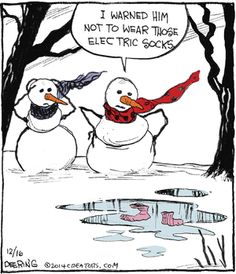


If there was no pope after 1958, why aren't all sedevacantists united under you? Isn't it important to have a pope?
Since there was no pope after 1958, the cardinals should have elected one, and some sedevacantists tried to arrange for this but were unable to do so. After that didn’t work, three ways to resolve this situation were proposed: 1) sedeprivationism, as was mentioned above, where conciliar claimants could transform from “material popes” to actual or “formal popes” by renouncing modernist heresies like those which prevented Roncalli from being elected in 1958; 2) sedevacantists could wait for God to miraculously elect a pope.
Some say that the Blessed Virgin Mary will designate someone as pope, some say Sts. Peter and Paul would designate a pope, or Elias and Elijah. However it were to happen, these sedevacantists are praying for a divine intervention to solve the problem. 3) Conclavism, or we elect a pope with the remaining sedevacantist laymen and clergy, following the elections of the Catholic Church where laymen and clergy participated.
“Conclavism” is just a word to describe basically the general idea of what particularly happened with pope Michael’s election. We reject the #1 sedeprivationist idea because someone’s either pope or not, and we believe the conciliar claimants are not popes, therefore there was no pope and we ought to proceed to elect a pope.
The #2 seeking for a miracle was never required in a past papal interregnum (time when there is no pope), nor is it laid down in the canon law that we ought to forgo elections and wait on such a miracle, nor does this seem necessary since we were capable of an election with the sedevacantist remnant.
Therefore, we have concluded that this also is not the correct resolution but that we ought to elect a pope and did so in 1990 with pope Michael’s election.

The Pope Speaks: December 2018
THE Sin of Today
Sacred Scripture says: “be not silent upon her iniquity.” (Jeremias 51:6) What is the KEY sin of today, from which all others flows? It is this sin we need to aim at, because all of the others will fall away of their own accord, if this sin is vanquished.
The key sin of today is the exaltation of our own private judgment above the judgments of God, His holy Church, and the hierarchy He has placed over us.
Private judgment originated with the Protestant Revolt five centuries ago. The Revolters exalted private judgment against the judgment of the Church. They promoted private interpretation of Sacred Scripture against the authority of the Church to interpret Scripture. “Understanding this first, that no prophecy of scripture is made by private interpretation.” (II Peter 1:20)
Jesus founded a Church and gave the Church the authority to keep the Faith He taught complete and sound throughout all ages. “And if he will not hear them: tell the church. And if he will not hear the church, let him be to thee as the heathen and publican.” (Matthew 18:17) Saint Paul tells us there should be: “One Lord, one faith, one baptism.” (Ephesians 4:5) To be Christian, we must all believe the same thing and also believe what was believed at the time of Jesus and handed down to us by the Apostles and their true successors.
Judgment on many issues in the Church are left solely to the hierarchy of the Church. Saint Paul said: “Take heed to yourselves, and to the whole flock, wherein the Holy Ghost hath placed you bishops, to rule the church of God, which he hath purchased with his own blood.” (Acts 20:28) If the Bishops are placed to rule the Church of God, the Church of God in turn is obliged to obey their Bishop. To the Apostles and their successor, Jesus said: “He that heareth you, heareth me; and he that despiseth you, despiseth me; and he that despiseth me, despiseth him that sent me.” Saint Paul says: “Obey your prelates, and be subject to them. For they watch as being to render an account of your souls; that they may do this with joy, and not with grief.” (Hebrews 13:17)
As Catholic Christians, to use the term used by Saint Vincent of Lerins, we are obliged to be obedient to our Bishop. The Bishop in turn is obedient to the Pope and the Pope in turn should be obedient to Jesus Christ.
In the 1960's and 1970's this was all turned upside down, when the man claiming to be Pope started teaching false doctrine. The Bishops also joined in with him. And so, following the advice of Saint Paul, we departed from them. “But though we, or an angel from heaven, preach a gospel to you besides that which we have preached to you, let him be anathema.” (Galatians 1:8)
And so many tried to sort things out on their own. Where should we go? And thus the season of private judgment began. When the sheep (Bishops) turn out to be wolves in sheep's clothing, we must desert them, because they have deserted Jesus Christ by their treachery. (Matthew 7:15)
Some today cite the precedent of the Western Schism, when there were first two, then three men claiming to be Pope. And yet, few are actually obedient to a Pope. Instead, they pick and choose what they will believe and whom they will obey and how much they will obey him. This is private judgment.
Saint Antoninus reports of the Western Schism: “Although it is necessary to believe that there is but one supreme head of the Church, nevertheless, if it happens that two Popes are created at the same time, it is not necessary for the people to believe that this one or that one is the legitimate Pontiff; they must believe that he alone is the true Pope who has been regularly elected, and they are not bound to discern who that one is; as to that point, they may be guided by the conduct and opinion of their particular pastor.” 1 In the Western Schism the faithful followed their Bishops, who in turn made a judgment about which claimant to the Papacy to follow. No one followed private judgment, but obeyed their Bishops. The Bishop in turn was obedient to the claimant to the papacy he had discerned was truly Pope. In most cases the Bishops would consult with theologians and canonists in their area and would agree with each other on which claimant to follow.
But isn't today different? There are differences, but the duty to be subject to the Pope remains for all Catholic Christians. And this duty applies not only to the faithful, but to priests and bishops. Authority comes from Jesus Christ through the Pope to the Bishops of the various dioceses.
In Psalms (56:11) we read: “And meet impudent dogs, they never had enough: the shepherds themselves knew no understanding: all have turned aside into their own way, every one after his own gain, from the first even to the last.” There is much to consider here. “The shepherds themselves knew no understanding.” The shepherds are the Bishops that went into Vatican II with no understanding. They approved the most vile heresies and walked out as leaders of a non-Catholic sect, which they called the Conciliar Church or the Church of the Council (Vatican 2).
The prophet Osee (3;4) tells us: “For the children of Israel shall sit many days without king, and without prince, and without sacrifice, and without altar, and without ephod, and without theraphim.” The king here is the Pope, the princes are the Bishops. Without a Pope and Bishops eventually we have no Sacrifice of the Mass offered that is pleasing to Almighty God. The Ephod is the vestment of the High Priest and could be considered similar to the Tiara of the Pope. The theraphim is a priestly garment. (Judges 17:5)
“Then he said: I saw all Israel scattered in the mountains, like sheep without a shepherd: and the Lord said: These have no masters: let every man return to his own house in peace.” (II Chronicles 18:6) This is where Catholics were in the 1960's, our shepherds all deserted us. In this terrible time, we could not heed Saint Anotninus' advice and follow our Pastor, because we had no Pastor. The prophet Isaias (53:6) explains what happened to us: “All we like sheep have gone astray, every one hath turned aside into his own way: and the Lord hath laid on him the iniquity of us all.” We all turned to our own way and made private judgments.
Unfortunately, many have taken judgments, which are reserved to the hierarchy of the Church into their own hands. Although the hierarchy deserted us in the 1960's there was a solution. “Awake, O sword, against my shepherd, and against the man that cleaveth to me, saith the Lord of hosts: strike the shepherd, and the sheep shall be scattered: and I will turn my hand to the little ones.” (Zacharias 13:7) God will have mercy on us, when we return to Him and to obedience to Him and the hierarchy He has appointed.
A question arises, aren't the Traditionalist bishops and priests our bishops and pastors? Yes, some may use this terminology, but if you read their technical articles, they admit that they are not the Bishop of our Diocese nor the Pastor of our Parish. And so we cannot look to them for guidance, they do not have jurisdiction, which means the right to speak in the Name of Jesus Christ. We have no obligation of obedience to them and in fact cannot render them obedience.
And so, to whom should we turn? We have a duty to be subject to Jesus Christ and His holy Church. When our Pastor deserts, we look to our Bishop. When our Bishop deserts we look to the Pope. When the Pope deserts, we look to Jesus Christ and then look for the Pope Jesus has sent us. From Vatican II until 1990, the Papacy indeed was vacant. The right and duty of the Church is to supply herself with a Pope. In fact, as a perfect society, the Church always has a means to supply herself with a head.
This was discussed by bishops, priests and laity from the early 1970's, until an election was finally completed on July 16, 1990. Among bishops who considered the election of a Pope were Archbishop Marcel Lefebvre (1976 and 1988) and Bishop Peter Martin Ngo-Dihn Thuc. (1981 to 1983) Among priests were many, beginning with Father Joachin Saenz-Arriaga, who was joined by Fathers Aldolpho Zamora and Moises Carmona. Bishop Ngo-Dihn consecrated bishops in 1981 in order to preserve apostolicity of Orders until a Pope could be elected. He did so, because of his advanced age, not knowing how long it would take to assemble a conclave. Many who were in these discussions in the early 1980's became Thuc Bishops, including Fathers George Musey, Louis Vezelis, Robert McKenna, etc.
Today is a time of decision. “And Elias coming to all the people, said: How long do you halt between two sides? if the Lord be God, follow him: but if Baal, then follow him. And the people did not answer him a word.” (III Kings 18:21) We have two real claimants to the Papacy, and many false paths of private judgment. And so, if Francis is Pope, then it is time to go back to the Novus Ordo, accept Vatican II completely, etc. If Michael is Pope, then it is time to get behind him.
Other than these two options are paths of private judgment where there is no safety. There is safety in following our Pastor, our Bishop and the Pope. The Pope appoints a Bishop over us, who in turn appoints a Pastor over us. As we see in the Western Schism, that even if we follow the wrong Pope as many did, we are still safe in obedience. We are not safe outside of the hierarchy. Today the choice should be clear. And so, as Pope, We ask you: “How long will you sit on the fence and halt between two sides?”
1 Studies in Church History, volume 2, page 530


Dear soul, it is a joy to write to you again.
This month, we are going to change things up ever so slightly! This will serve us well, I think, as it will be both just a little bit of a break from the usual lessons and also an encouragement as we journey towards the great Feast of the Nativity of our Lord.
Regardless of liturgical calendar, regardless of particular Rite, we all of us - East and West - find ourselves in a time of preparation for the Nativity. Whether the four weeks of Advent or the Forty Days of the Nativity Fast, all children of the Church are expected to be preparing themselves well.
Though the actual practice of fast is often somewhat mitigated in various places in our day, the spirit of fast must nevertheless remain. The spirit of "kenosis" or "emptying" of ourselves in order that we might be filled by the very grace of God is the over-riding concern of the expectation that we feel at this time of the year.
With this in mind, let us take just a few words from the great fathers concerning the practice and the importance of fasting. There is little to be said that could possible add to the wisdom of those who have gone before us, living the life of genuine Faith. So let us hear their words and their experiences and take them with us!
Abba Daniel used to say, 'Abba Arsenius lived with us many a long year, and every year we used to take him only one basket of bread, and when we went to find him the next year we would eat some of that bread.'
Abba Benjamin said, 'We went to an old man who detained us for a meal, and he offered us oil of horse-radish. We said to him, "Father, give us rather a little good oil." At these words he crossed himself and said, 'I did not know there was any other kind."
Abba John the Dwarf said, 'If a king wanted to take possession of his enemy's city, he would begin by cutting off the water and the food, and so his enemies, dying of hunger, would submit to him. It is the same with the passions of the flesh: if a man goes about fasting and hungry, the enemies of his soul grow weak.'
It was said of Abba Isaac that he ate the ashes from the incense offering with his bread.
Isidore the Priest said, 'If you fast regularly, do not be inflated with pride, but if you think highly of yourself because of it, then you had better eat meat. It is better for a man to eat meat than to be inflated with pride and to glorify himself.'
Once the order was given at Scetis, 'Fast this week.' Now it happened that some brothers came from Egypt to visit Abba Moses, and he cooked something for them. Seeing some smoke, his neighbors said to the ministers, 'Look, Moses has broken the commandment and has cooked something in his cell.' The ministers said, 'When he comes, we will speak to him ourselves.' When the Saturday came, since they knew Abba Moses' remarkable way of life, the ministers said to him in front of everyone, 'O Abba Moses, you did not keep the commandment of men, but it was so that you might keep the commandment of God.'
Abba Joseph asked Abba Poemen, 'How should one fast?' Abba Poemen said to him, 'For my part, I think it is better that one should eat every day, but only a little, so as not to be satisfied.' Abba Joseph said to him, 'When you were younger, did you not fast two days at a time, Abba? The old man said: 'Yes, even for three days and four and the whole week. The Fathers tried all this out as they were able, and they found it preferable to eat every day, but just a small amount. They have left us this royal way, which is light.'
Abba Poemen said, 'Just as smoke drives the bees away and also takes the sweetness out of their work, so bodily ease drives the fear of God from the soul and dissipates all its activity.'
Abba Sisoes' disciple often said to him, 'Abba, get up, and let us eat.' And he would say to him, 'Have we not eaten, my child?' He would reply, 'No, Father.' Then the old man would say, 'If we have not eaten, bring the food, and we will eat.'
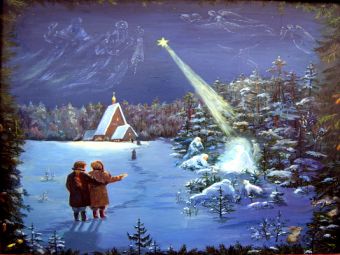


Saints from East and West
Saints whose feasts are celebrated this month
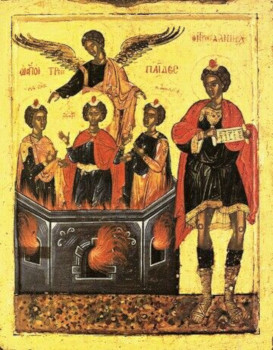
December 17 (Byzantine) - The Holy Prophet Daniel and the Three Holy Youths Ananias, Azarias, and Misael.
In the years following 600 B.C. Jerusalem was conquered by the Babylonians, the Temple built by Solomon was destroyed, and many of the Israelite people were led away into the Babylonian Captivity. Among the captives were also the illustrious youths Daniel, Ananias, Azarias and Misael. The emperor of Babylon, Nebuchadnessar, gave orders to instruct them in the Chaldean wisdom, and to dress them in finery at his court. But they, in cleaving to the commandments of their faith, refused the extravagance and led a strict manner of life; they indeed sustained themselves on only vegetables and water. The Lord granted them wisdom, and to Saint Daniel -- the gift of perspicacity and the interpretation of dreams. The holy Prophet Daniel, having preserved sacred faith in the One God and trusting on His almighty help, in his wisdom surpassed all the Chaldean astrologers and sorcerers, and was made a confidant to the emperor Nebuchadnessar. One time Nebuchadnessar had a strange dream, which terrified him, but upon awakening he forgot the details of the vision. The Babylonian wise-men seemed powerless to learn what the emperor had dreamt. Thereupon the holy Prophet Daniel gave glory before all to the power of the True God, revealing not only the content of the dream, but also its prophetic significance. After this Daniel was elevated by the emperor to be a lord of the realm of Babylonia.
During these times the emperor Nebuchadnessar gave orders to erect in his likeness - a huge statue, to which it was decreed to accord the honours befitting a god. For their refusal to do this, the three holy lads - Ananias, Azarias, and Misael - were thrust into a burning fiery furnace. The flames shot out over the furnace 49 cubits, felling the Chaldeans standing about, but the holy lads walked amidst the flames, offering up prayer and psalmody to the Lord (Dan. 3: 26-90). The Angel of the Lord in appearing made cool the flames, and the lads remained unharmed. The emperor, upon seeing this, commanded them to come out, and was converted to the True God.
Under the following emperor Balthasar, Saint Daniel interpreted a mysterious inscription ("Mene, Takel, Phares"), which had appeared on the wall of the palace during the time of a banquet (Dan. 5: 1-31), which foretold the downfall of the Babylonian realm. Under the Persian emperor Darius, Saint Daniel was slandered by his enemies, and was thrown into a den with hungry lions, but they did not touch him, and he remained unharmed. The emperor Darius then in rejoicing over Daniel gave orders throughout all his realm to worship the God of Daniel, "since that He is the Living and Ever-Existing God, and His Kingdom is unbounded, and His sovereignty is without end" (Dan. 6: 1-29). The holy Prophet Daniel sorrowed deeply for his people, who then were undergoing righteous chastisement for a multitude of sins and offenses, for transgressing the laws of God, resulting in the grievous Babylonian Captivity and the destruction of Jerusalem: "My God, incline Thine ear and hearken, open Thine eyes and look upon our desolation and upon the city, in which is spoken Thine Name; wherefore do we make our supplication before Thee, trusting in hope not upon our own righteousness, but upon Thy great mercy" (Dan. 9: 18). By his righteous life and prayer for the redeeming of the iniquity of his people, there was revealed to the holy prophet the destiny of the nation of Israel and the fate of all the world.
During the interpretation of the dream of the emperor Nebuchadnessar, the Prophet Daniel declared about the kingdoms replacing one another and about the great final kingdom - the Kingdom of our Lord Jesus Christ (Dan. 2: 44). The prophetic vision about the seventy of weeks (Dan. 9: 24-27) tells the world about the signs of the First and the Second Comings of the Lord Jesus Christ and is connected with those events (Dan. 12: 1-12). Saint Daniel interceded for his people before the successor to Darius, the emperor Cyrus, who esteemed him highly, and who decreed freedom for the Israelite people. Daniel himself and his fellows Ananias, Azarias and Misael, all survived into old age, but died in captivity. According to the testimony of Sainted Cyril of Alexandria (Comm. 9 June), Saints Ananias, Azarias and Misael were beheaded on orders of the Persian emperor Chambyses.
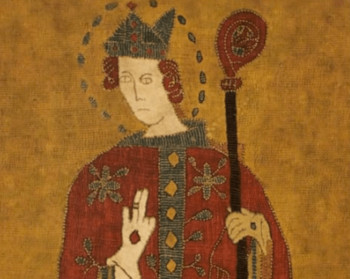
December 23 - Saint Thorlac, Bishop of Skálholt
Christianity was planted in Iceland at the end of the tenth and the beginning of the eleventh century, and made such progress that the island was soon divided into two dioceses, Skálholt and Hólar, which in 1152 were made suffragans of Nidaros (Trondhjem): Iceland had been colonized and evangelized from Norway. During the twelfth century two bishops, one from each see, were venerated as saints locally and in Norway, namely, John of Holar and Thorlac of Skalholt. The life of the last-named is narrated in the Thorlakssaga by a cleric of Skálholt. We are told that Thorlac Thorhallsson was a deacon when he was fifteen and a priest three years later, and then, being a promising young man, was sent abroad to study: he is said to have visited Lincoln. After ten years, in 1161, Thorlac returned to Iceland full of reforming zeal. He was joyfully received by his mother and sisters, who expected him to settle down to the semi-secular life led by most of the clergy there in those days, but instead he devoted himself to study and the ministry. His biographer gives an account of Thorlac's daily rule of life, which began with the singing of the Credo, Pater noster, and a hymn as soon as he awoke; he recited a third of the psalter every day, and had an especial devotion to the titular saints of the churches in which he ministered. Some years later an heirless farmer died, leaving his land and house to the Church with instructions that Thorlac should establish a monastery there, and he accordingly formed a community of canons regular, of which he was abbot. We are told that Thorlac's mother went with him to Thykkviboer to be cook and housekeeper for the new community. In 1178 he became bishop of Skálholt, and was consecrated by Archbishop St Eystein in Nidaros.
The way was now clear for Thorlac to introduce and promote the higher spiritual standards and improved ecclesiastical discipline which he knew that the good of souls required and the Church demanded. On the side of discipline this resolved itself chiefly into endeavours to impose the observance of clerical celibacy and to abolish lay patronage and impropriation, with their associated abuse of simony, and his episcopal career is a record of his efforts in these directions and the successes, difficulties and checks with which he met. He received far more opposition than encouragement, often from men of goodwill or from those to whom he could reasonably look for support, but to the end he did not withdraw from the struggle or modify his policy. He had the encouragement of his metropolitan, the forceful St Eystein, who was fighting a similar battle in Norway, and with his approval used the weapon of excommunication for the first time in Iceland. In his sixtieth year Thorlac determined to resign his see and retire to the abbey of Thykkviboer, but death overtook him before he could put this resolution into effect, on December 23, 1193.


Books to feed your faith!
Mirror of the Blessed Virgin Mary
$4.95
There is no doubt, as St. Jerome remarks, that whatever is worthily said of Our Blessed Mother redounds wholly to the praise and glory of God. Therefore, for the honor and glory of Our Lord Jesus Christ, and ardently desiring to produce a work which will tend to the praise of His most glorious Mother, I have judged it fitting to take for the subject-matter of my treatise the most sweet Salutation of this Blessed Mother. But I acknowledge my utter insufficiency for such an undertaking. First, because of the sublimity of the subject; secondly, because of the slenderness of my knowledge; thirdly, because of the aridity of my speech, and, finally, because of the unworthiness of my life, and the supreme glory and praiseworthiness of the person whose praises I wish to sing. By Saint Bonaventure.
Novenas to the Blessed Virgin Mary
$7.00
Saint Alphonsus recommends making a Novena prior to each of the seven major feasts of the Blessed Virgin Mary. Devout clients of Mary are all attention and fervor in celebrating the novenas, or nine days preceding her festivals; and the Blessed Virgin is all love, in dispensing innumerable and most special graces to them. St. Gertrude one day saw under Mary's mantle, a band of souls, whom the great Lady was considering with the most tender affection; and she was given to understand that they were persons who, during the preceding days, had prepared themselves with various devotions for the Feast of the Assumption.
Loreto and the Holy House
$14.95
In reply to a petition made to him by the Bishops of the Province of Piceno, in which Loreto stands, our Holy Father Pope Benedict XV. has issued a Decree, dated April 12, 1916, ordering the Feast of the Translation of the Holy House to be henceforth observed each year, on the loth of December, in all the Dioceses and Religious Congregations of Italy and the adjacent isles. Moreover, by the same Decree he grants permission for the extending of the festival to all other Dioceses and Religious Congregations, on its being applied for by the Ordinaries. The Pontiff expressly grounds the granting of this favour on the acknowledged pre-eminence of the Loreto Sanctuary, it being. as the preamble states. II the House itself-translated from Palestine by the ministry of Angels-in which was born the Blessed Virgin Mary, and in which the Word was made flesh."
For More Good Traditional Catholic Books:


Steamed Christmas Pudding
The Old Favourite!
Prep: 20 minutes
Cook: 3 hours
Ready In: 3 hours 20 minutes
It simply is not the Christmas season without the Christmas Pudding. Ever a welcome sight upon your family's dinnertable, there's truly none like it. Grandfather's favourite! Uncle Vigo always attested that a good shot of brandy over each serving added the right festive touch, but we leave that to your discretion.
Ingredients
1 1/2 cups self-rising flour
1 cup white sugar
1 teaspoon ground cinnamon
2 eggs, beaten
1/4 cup melted butter
1/2 cup prepared mincemeat pie filling
1/2 cup whole cranberry sauce
1/2 cup pumpkin puree
1 (8 ounce) container sour cream
1 (8 ounce) package cream cheese
1/3 cup confectioners' sugar
Directions
Grease one 2-quart lidded pudding mold. Sift together the flour, sugar and cinnamon; set aside.
In a large bowl, mix together the eggs, butter, mincemeat, cranberry sauce and pumpkin. Add to flour mixture and mix until smooth; pour into pudding mold.
Place a rack in the bottom of a large pot, over medium heat, and fill 1/2 way up with boiling water. Place the pudding on the rack. Steam for 2 1/2 hours.
Check the pan occasionally and add more water if needed. Check for doneness by inserting a toothpick in the center. When firm, place the pudding mold on a rack outside of the water for 10 minutes and unmold.
Prepare a sauce by blending together the sour cream, cream cheese and confectioners sugar. Spoon dollops over warm pudding and serve.
Alma Mae's Soft Christmas Cookies
The taste of home and holidays
Cook: 8 minutes per batch
Here's Alma Mae's tried and true recipe for soft cut-out Christmas sugar cookies. No store-bought cookie ever did compare to a fresh batch of Alma Mae's cookies; try them, and I'm sure you'll agree! (Alma Mae would always sprinkle the cookies with colored sugar before baking. Alternately, you can also put icing on the cookies after they've cooled.)
Ingredients
3 3/4 cups all-purpose flour
1 teaspoon baking powder
1/2 teaspoon salt
1 cup margarine, softened
1 1/2 cups white sugar
2 eggs
2 teaspoons vanilla extract
Directions
Sift flour, baking powder, and salt together, set aside. In a large bowl, cream together the margarine and sugar until light and fluffy. Beat in the eggs one at a time, then stir in the vanilla. Gradually blend in the sifted ingredients until fully absorbed. Cover dough, and chill for 2 hours.
Preheat oven to 400 degrees F (200 degrees C). Grease cookie sheets. On a clean floured surface, roll out small portions of chilled dough to 1/4 inch thickness. Cut out shapes using cookie cutters.
Bake 6 to 8 minutes in the preheated oven, or until edges are barely brown. Remove from cookie sheets to cool on wire racks.

Video sermons and instructions: Both brand new and from years past!
Saint Stephen 2010 Sermon
Gaudete Sunday 2012
The Spiritual Life Simplified
Sacred Moments - A Servant Who Blesses
Sacred Moments


VIE CATHOLIC RADIO EVENTS FOR DECEMBER

What's on During Advent?
The First Sunday of December is the beginning of Advent, Advent is a period of preparation, extending over four Sundays, before Christmas. The word Advent comes from the Latin advenio, "to come to," and refers to the coming of Christ. This refers, first of all, to our celebration of Christ's birth at Christmas; but second, to the coming of Christ in our lives through grace and the Sacrament of Holy Communion; and finally, to His second coming at the end of time.
Our preparations, therefore, should have all three comings in mind. We need to prepare our souls to receive Christ worthily. With that in mind. We at Vatican In Exile Radio want to tell you about the new programing for the month of December.
Sermons on Advent:
Each week we will have a different sermon by different preachers, on the subject of Advent. Along with a Advent Devotion for each week that not only will play after the the Advent sermon but allso through out the week during other program segments.
Christmas Anthology
This is a Christmas and New Year's Anthology. It is a dramatization in twelve parts from the 1950's that portrays twelve different Christmas and New Year's stories as taking place in both biblical and modern times.
Christmas Eve and Christmas Day Specials!
All day on Christmas Eve and Christmas day we will have Dramatized Christmas specials like The Nut Cracker, The Christmas Carol, It's a Wonderful Life, and so much more!!! Also we will play plenty of Christmas music on both those special days!
And don't forget the other great programing that you can hear!
The Angelus and The Rosary:
Everyday the Angelus, which commemorates the Incarnation of Jesus, and the Rosary, which is a devotion in honor of the Virgin Mary, is said morning, noon and night. Follow along with us in prayer everyday!
Lamp and Light:
Lamp and Light Bible study takes the listener through the entire Bible, threading back and forth between the Old and New Testaments. Be sure to tune in so that you will not miss any part of the Bible study.
Sacred Moments:
It has been said that “The higher goal of spiritual living is not to amass a wealth of information, but to face sacred moments.” and that is what our desire is for you. To experience through our weekly devotion, a sacred moment. One that you can savor through out the day. One that reminds you that God is alive and active in your live.
Sunday Sermon:
You can listen to four Sunday Sermons, including one by Saint Alphonsus, each day that could cause permanent life changes by stepping on your toes!
Life Is Worth Living:
Fulton Sheen's renowned and inspiring television series was watched by millions of viewers from all walks of life and every religious belief. His timeless insights give wise, personal and inspiring guidance on the problems affecting our lives in today’s world. His talks cover an amazing variety of subjects, from the character of the Irish to the handling of teenagers. He discusses education, Christianity, relativity, and world affairs. He speaks about love, conscience, fear, motherhood, work. He tells amusing anecdotes, recites poetry, and ponders the fate of the free world as well as America’s destiny.
Fulton Sheen's Catechism:
...is a 50 part series on the fundamental teachings of the Catholic Church recorded in 1965 in the privacy of his own study. This Catechism program is truly priceless! Fulton Sheen's captivating voice and message comes through loud and clear, even for today.
Catechism Corner:
Catechism Corner discuss the lessons given in Fr. Cogans' Catechism book called “A Brief Catechism for Adults”. You won't want to miss a lesson!
Family Theater:
Family Theater is a dramatic radio show which was produced by Family Theater Productions, a film and radio studio extension of the Family Rosary Crusade founded by the Holy Cross Priest, Father Patrick Peyton, CSC, as a way to promote family prayer. The motto of Holy Cross Family Ministries is "The family that prays together stays together."
Your Story Hour/The Bible Comes Alive:
Your Story Hour produces family-friendly radio dramas based on the Bible, historical heroes, and true-to-life adventures. Our stories--brought to life by talented voice actors, descriptive sound effects and compelling music--teach Christian values, positive character traits and principles for good decision-making.
Ranger Bill:
Ranger Bill is a Christian radio program from the 1950s. Ranger Bill stars Miron Canaday as the title character and Stumpy Jenkins. And Ed Ronne Sr. as Grey Wolf. The main character, Ranger Bill, is a forest ranger located in the town of Knotty Pine along the Rocky Mountains. The show describes the various tales of the adventures of Ranger Bill and his friends
Plus More!:
Such as Paul Harveys' The Rest of The Story, Keys For Kids, Creation Moments, Life Line, and a new program called “No Apologies”!- No Apologies is a Basic apologetics of the Catholic Church, that defends the faith, with a Marian emphasis.
These are just some of the little jewels you can hear through out the week.
Music To Tickle Your Ears:
We have a whole genre of musical programs. Such as Friday Night Gospel Bluegrass, Saturday Night Alive-Praise and Worship, and Sounds of Joy-Sacred Music. That doesn't count the Gregorian Chant heard every day four times a day! Plus plenty of Advent music and Christmas music!
Check your program guide to see times and days for each program.


“WRONG ON VIRUSES"
Ephesians 5:6
“Let no man deceive you with vain words. For because of these things cometh the anger of God upon the children of unbelief”
When studying popular-style articles about evolution, it is as important, if not more important, to study their use of language as it is to check the science. It is frequently the case that such an article needs to admit that previous thoughts on the subject were all wrong, but they cannot admit this; otherwise, their support for evolution would be in doubt. It is so often assumed that the theory of evolution is a large edifice that has exact things to say on a variety of life forms, but, in practice, there is considerable confusion even over their own ideas, leading to much dissemblance in their use of language. We have mentioned before that one of the most common linguistic constructions used in such articles is what some have called “fuzzy words”. These are words and phrases, whereby the author manages to make an insinuation about evolution without committing themselves openly to where they stand.
For example, a recent article about the possible evolution of bacterial viruses looked at how some viruses can alter the way that they attack their hosts, so that they can attack a different type of host. This would be how certain viruses can cross species. The article tried to describe how such viral innovation could have evolved, thus:
Researchers… have discovered evidence for a new path of evolution, and with it a deeper understanding of how quickly organisms such as viruses can adapt to their environment.
This “deeper understanding” really means to rewrite all that they knew on the subject.

Catechism Catch-Up
The Militant Church and the Armour of God

What are the tools that have been given the Militant Church for struggling against the world, the flesh and the devil?
For though we walk in the flesh, we do not war according to the flesh. For the weapons of our warfare are not carnal, but mighty to God unto the pulling down of fortifications, destroying counsels, And every height that exhalteth itself against the knowledge of God, and bringing into captivity every understanding unto the obedience of Christ. (II Corinthians 10:3-5)
Finally, brethren, be strengthened in the Lord, and in the might of his power. Put you on the armour of God, that you may be able to stand against the deceits of the devil. For our wrestling is not against flesh and blood; but against principalities and power, against the rulers of the world of this darkness, against the spirits of wickedness in the high places. Therefore take unto you the armour of God, that you may be able to resist in the evil day, and to stand in all things perfect. Stand therefore, having your loins girt about with truth, and having on the breastplate of justice, And your feet shod with the preparation of the gospel of peace: In all things taking the shield of faith, wherewith you may be able to extinguish all the fiery darts of the most wicked one. And take unto you the helmet of salvation, and the sword of the Spirit (which is the word of God). By all prayer and supplication praying at all times in the spirit; and in the same watching with all instance and supplication for all the saints (Ephesians 6:10-18)
I looked up all the Scripture references to armour, searching for passages that would support and enhance the importance of wearing armour when charging off into battle. What I found was not exactly what I had expected. I found that Saul’s armour did not fit David and that Goliath’s armour was useless against David’s stone. I also discovered that a stray arrow found a crack in Ahab’s armour, killing the wicked king. It seems that the armour was, in reality, not very
useful !
But then I realized that we are not called to wear the faulty body armour of Saul, Ahab, or Goliath. Rather, we must put on the unfailing armour of God! In fact, at the very moment that St. Paul wrote his letter to the Ephesians, he might well have been chained to a soldier wearing the armour of the Roman Empire. St. Paul could see firsthand how frail the defenses of man were against the prince of darkness. This is why he twice emphasized “the armour of God.” Also St. Paul seamed to be expanding on the words of the Old Testament prophet Isaias/Isaiah, who had made a similar spiritual association for two of the articles of armour. “He put on justice as a breastplate, and a helmet of salvation upon his head:” (Isaias/Isaiah 59:17).
Now we must be careful not to miss the importance of wearing all of the articles of the armour that God provides. Ephesians 6:11 says, “Put on the armour of God,” and Ephesians 6:13 declares, “Wherefore take unto you the armour of God.” and then 7 articles of the armour is mentioned. If you do not wear all seven articles then the armour is faulty. It should be all or nothing! This is where many Catholics fail. They take some of the armour, but forget one or two parts of the suit—and pay an eternal price for their neglect. Under the inspiration of the Holy Ghost, the apostle Paul attaches a spiritual association to seven implements of earthly armour. Let’s consider each of these articles of defense one by one to see what we can learn.
"Stand therefore, having your loins girt about with truth"
In Bible times, the girdle about the waist held together the soldier’s garments, which might otherwise hamper his movements while marching or engaging in combat. The spiritual significance is that God does not simply want us to point at the truth; He wants us to wear it and have it wrapped about us. Not only does the belt hold everything in place, but it also serves to carry the sheath that holds the sword of the Spirit for ready access. Some people have the sword of God’s Word, but without the belt of truth they come to reckless conclusions.
"But if I tarry long, that thou mayest know how thou oughtest to behave thyself in the house of God, which is the church of the living God, the pillar and ground of the truth." (I Timothy 3:15)
Understand that the Girdle of Truth held the sheath , that is the Church. And the sheath, the Church, held the sword of God's Word which is is truth handed down, truth spoken, and truth written. With out the girdle of Truth, and with out the sheath of the Church, what has happened is that those who have left the Church for some other Denomination took there sword with them (the Word of God) but did not take the girdle of Truth and nor did they take the sheath. Thus they had nothing to hold the rest of armour together. By not having Jesus the girdle of Truth (John 14:6), and by not having the sheath which is the True Church, the Catholic Church, the pillar and ground of the truth, They all "have gone astray, every one hath turned aside into his own way:" (Isaias/Isaiah 53:6)
Never forget that wearing the girdle of truth also means wearing Christ, for He is “the way, the truth, and the life” (John 14:6). This is why Paul said: “For as many of you as have been baptized in Christ, have put on Christ.” (Galatians 3:27)
Breastplate of Justice ( Righteousness)
"One who has put on a sturdy breastplate is difficult to wound. Especially well-protected are those essential parts of the body upon which life depends." "One protected by such a breastplate of justice will not be like a vulnerable stag that receives the arrow to the liver. He will not lapse into rage or lust. Rather he will be protected, having a clean heart, having God as the fashioner of his breastplate, since he fashions the whole armour for every one of the saints."-St. Jerome
With all watchfulness keep (guard) thy heart, because life issueth out from it. (Proverbs 4:23)
What is Justice?
My tongue shall pronounce thy word: because all thy commandments are justice (righteousness). (Psalm 118 DRB/119:172)
Whosoever committeth sin committeth also iniquity; and sin is iniquity. (1 John 3:4)
Awake, ye just, and sin not. For some have not the knowledge of God, I speak it to your shame. (1 Corinthians 15:34)
To be just is to do what is just or right in God's eyes. God's commandments are righteous. In contrast, sin is iniquity, and iniquity is the opposite of righteousness. So to be righteous is to obey God's laws of love.
And we are all become as one unclean, and all our justices (righteousness) as the rag of a menstruous woman: and we have all fallen as a leaf, and our iniquities, like the wind, have taken us away. (Isaias /Isaiah 64:6)
Righteousness may deliver from death, but whose righteousness are we talking about? The above scripture makes it clear that our individual level of righteousness is on par with "rags of a menstruous woman"—and when you're looking to protect yourself from death, filthy bloody rags make for a lousy breastplate.
In those days shall Juda be saved, and Israel shall dwell confidently: and this is the name that they shall call him: the Lord our just one (our righteous one). (Jeremias/Jeremiah 23:6)
It is God's Justice, God's righteousness, and not our own, which must serve as our breastplate and defense against Satan.
Feet Shod with the Preparation of the Gospel of Peace
The gospel is to be carried abroad. It is to be preached among the nations. Wherever, then, it is preached, it must be heard. But so that all may hear, one must use one's feet to travel. And so do we travel with haste and urgency.- St. Marius Victorinus
Your footwear is not put on in order that you may walk about foolishly but to accomplish the course of the gospel. In this way you will receive the prophetic blessing: How beautiful upon the mountains are the feet of him that bringeth good tidings. Isaias (Isaiah) 52:7- St. Theodoret
How fitting is it that the words of Isaias (Isaiah) 52:7 come immediately before he presents the greatest and most complete Messianic prophecy in all the Old Testament. And that is Chapter 53 where he gives us a pen portrait of the suffering Saviour and tells us of the glorious work of the cross He was to undertake in order that the the sin question might be settled forever to the satisfaction of God.
How then shall they call on him, in whom they have not believed? Or how shall they believe him, of whom they have not heard? And how shall they hear, without a preacher? And how shall they preach unless they be sent, as it is written: How beautiful are the feet of them that preach the gospel of peace, of them that bring glad tidings of good things! (Romans 10: 14-15)
The early fathers are very clear that Romans 10:14-15 is a reference to the Apostles and those who have been ordained after them:
"Paul quotes the prophet Nahum by talking about feet he means the coming of the apostles who went around the world preaching the the coming of the kingdom of God."-Ambrosiaster
There is a difference between Preaching and Witnessing
To Preach:
To be a herald, to officiate as a herald; to proclaim after the manner of a herald; it is always with the suggestion of formality, gravity and an authority which must be listened to and obeyed
To Witness:
A witness in a legal sense. In an historical sense it is one who is a spectator of anything, e.g. of a contest. In an ethical sense those who after his example have proved the strength and genuineness of their faith in Christ by undergoing a violent death
The commandment to Preach the Gospel through out the world was given to the Apostles and there Succesors.
And he said to them: Go ye into the whole world, and preach the gospel to every creature. (Mark 16:15)
All the Early Fathers would agree on this.
"He willed that the apostles as spiritual predecessors of the new humanity would be sent by his Son into the entire world, so that all humans sufferers might come to the knowledge of their creator."- Novatian
"Then in this same way the apostles went out to found churches in every city possible. It is from these apostolic churches that all the subsequent churches, on after the other, derived the rule of faith and the seeds of doctrine. Even to today they continue to dervie from the apostles that which is necessary in order that they are able to deem themselves as apostolic, as being the offspring of apostolic churches."- Tertullian
The commandment to be Witnesses was given to all Catholics not just to Apostles and there Succesors.
But you shall receive the power of the Holy Ghost coming upon you, and you shall be witnesses unto me in Jerusalem, and in all Judea, and Samaria, and even to the uttermost part of the earth. (Acts 1:8)
It is the Holy Ghost who empowers you at your comformation to give testimony to those around you of what God has done for you through Christ and His Church, and prompts you to witness to a lost world.
So whether given by the Church to Preach the Gospel of Peace or as confirmed Catholics being witnesses to the Gospel of Peace, We all should be shod with the Gospel of Peace, telling everyone we meet what God can do, has done, and will do for all those who believe that Christ was born, died and was resurrected for each and every one of them. That they must repent of their sins, and be baptized into the Church.
The Shield of Faith
Now faith is the substance of things to be hoped for, the evidence of things that appear not. (Hebrews 11:1)
But without faith it is impossible to please God. For he that cometh to God, must believe that he is, and is a rewarder to them that seek him. (Hebrews 11:6)
The Roman shield of the time was called a scutum. This type of shield was as large as a door and would cover the warrior entirely. Such a shield was not just defensive but could also be used to push opponents. When fighting as a group, a body of troops of soldiers could position their shields so as to form an enclosure around themselves, called a testudo (“tortoise”). This was especially helpful to protect against arrows launched from the walls of cities they were attacking. Shields, often made of wood and then covered in hide, when wet, could extinguish flaming arrows.
Clearly, a shield is vitally important to a soldier. It provides a blanket of protection. It is meant to be taken up in all circumstances. It is the first barrier against the enemy’s attack. Often, shields were painted with identifying marks; a Christian who takes up the shield of faith identifies himself as a foot soldier who serves the Commander of the Lord’s army (see Joshua 5:14).
Satan’s attacks can sometimes cause us to doubt God. Faith prompts us to believe God. We give in to temptation when we believe what it has to offer is better than what God has promised. Faith reminds us that, though fulfillment of God’s promise may not be readily visible to us, God is true to His Word. When Satan attempts to plague us with doubt or entice us with instant gratification, faith recognizes the deceptiveness of his tactics and quickly extinguishes the arrows. When Satan accuses us, faith chooses to believe that Jesus has redeemed us and that there is no more condemnation.
All believers have this promise: “For whatsoever is born of God, overcometh the world: and this is the victory which overcometh the world, our faith.” (1 John 5:4). Faith is a protective barrier between us and the schemes of Satan. When we believe God and take Him at His word, we remain grounded in truth, the lies of the enemy lose their power, and we become overcomers. In that way, faith is our shield.
Helmet of Salvation
The fifth piece of God’s armor is represented by the Roman soldier’s helmet, without which he would never enter battle. Some of the helmets were made of thick leather covered with metal plates, and others were of heavy molded or beaten metal. They usually had cheek pieces to protect the face.
The purpose of the helmet, of course, was to protect the head from injury, particularly from the dangerous broadsword commonly used in the warfare of that day. That was not the much smaller sword mentioned later in this verse, but was a large two–handed, double–edged sword (rhomphaia, see Apocalypse /Revelation 1:16; 2:12; 6:8) that measured three to four feet in length. It was often carried by cavalrymen, who would swing at the heads of enemy soldiers to split their skulls or decapitate them.
The two dangerous edges of Satan’s spiritual broadsword are discouragement and doubt. To discourage us he points to our failures, our sins, our unresolved problems, our poor health, or to whatever else seems negative in our lives in order to make us lose confidence in the love and care of our heavenly Father, and to begin to doubt and question God's love and care for us.
The Sword of the Spirit Which is the Word of God
The Word of God is the source of victory over the enemy. It is the sword of the Spirit which is the Word of God that gives us the weapon against our enemy.
The previous armor has been primarily defensive. But now we come to a piece of armor that is both defensive and offensive.
Now the word sword here is a very interesting term. It is the word in the Greek, machaira, and it’s a very common word in Greek, a very common word even in the New Testament. The other word for sword, rhomphaia. It refers to that large broadsword we mentioned. It could be as long as forty inches plus, longer than a yardstick, a great, broad, two-edged sword that was wielded with two hands. That is not in view here. This is the more normal sword carried by the soldiers, the machaira, anywhere from 6-inch long daggers to 18-inch swords or so. They were put in a sheath or a scabbard by the side of the soldier and were used in hand-to-hand combat. That’s what’s in view. In fact, by the way, machaira, is the word used to describe the swords, in Matthew 26:47, that were in the hands of the Romans who came to capture Jesus while He was in the garden. It was the normal Roman soldier’s sword. It is the same word used to speak of the sword with which St. Peter cut off the ear of the servant of the high priest. It is the same word used, machaira, to speak of the sword used in Acts 12:2 to kill St. James. It is the same word, machaira sword, used to speak of the sword used against the heroes of the faith in Hebrews 11. It is the normal sequence of sizes in this machaira, concept that was the everyday routine sword used by soldiers. But in each case it seems apparent that a machaira, had to be used in a rather precise way to be effective. Now St. Peter simply cut off an ear with it. I’m sure that if he had a rhomphaia he’d have come all the way from the ear to the tip of the guys toe. The machaira, had to be used as a precise weapon.
Again, the sword as a weapon is both defensive and offensive. Let’s talk about its defensive capability. If you’ve ever seen anybody use a sword, you know that a sword is used as much to parry a blow as it is to inflict one. And a person who uses a sword uses it along with that part which covers his hand to defend himself against the blows of his enemy. And the way you use the Word of God defensively is really critical. Satan comes to attack you with his temptations. He comes to attack you with his assaults, and you can literally parry his blows with the proper use of the Word of God.
We see Jesus, in Matthew chapter 4 and in Luke chapter 4 parrying with Satan. Satan comes to Him three times and Satan attacks Him with three direct temptations.
Notice at the end of Ephesians 6:17 it says the sword of the Spirit is the Word of God. The term, “Word,” here is not the greek word logos. Logos is a term meaning word that speaks of a broad or general reference. "Word" here is the word rhēma, and it means a specific statement. It isn’t talking about a broad knowledge. It’s talking about a specific statement. The sword of the Spirit is the specific statement of God. You must learn to know the total of the Word of God so that you know the specifics and be specific in the use of the Word of God.
This is why you must learn the principles of the Word of God, and that’s why you have to study to show yourself approved unto God. We need to study scripture, read the commentaries of the Early Fathers, listen closely to what the Church teaches. Know your Catechism. You see when we as Catholic speak of the Word of God we can be speaking of it in three ways:
The Living Word of God, Jesus himself.
And the Word was made flesh, and dwelt among us, (and we saw his glory, the glory as it were of the only begotten of the Father,) full of grace and truth. (John 1:14)
The Spoken Word of God.
And he (Jesus) was preaching in the synagogues of Galilee. (And) the multitudes pressed upon him to hear the word of God, (Luke 4:44; 5:1)
And when they had prayed, the place was moved wherein they were assembled; and they were all filled with the Holy Ghost, and they spoke the word of God with confidence. (Acts 4:31)
The Written Word of God
Carefully study to present thyself approved unto God, a workman that needeth not to be ashamed, rightly handling the word of truth. (2 Timothy 2:15)
All three, The Living Word, The Spoken Word, The Written Word, are considered The Sword of the Spirit. And all three are needed as part of your armour when battling against principalities and power, the rulers of the world of this darkness, the spirits of wickedness in the high places.
All Prayer
The last of the armaments was really an attitude. Any general knows that victory almost always depends on which army has the element of surprise. In the story of Gideon, the soldiers were chosen based upon their watchfulness, and they caught the enemy sleeping and won through surprise. (See Judges 7) Even the best of armor is almost useless if the soldiers are found dozing. We are commanded to be "watching with all instance (all perseverance)”
The prayer mentioned here is not just any prayer. No, it is more specific then that. St.Paul says, "watching with all instance and supplication for all the saints" We are to be praying for our fellow Christians, our fellow Saints.
St. Paul lived what he preached!
"Therefore we also, from the day that we heard it, cease not to pray for you" (Colossians 1:9)
"Wherefore I also, hearing of your faith that is in the Lord Jesus, and of your love towards all the saints, Cease not to give thanks for you, making commemoration of you [remembering you] in my prayers. (Ephesians 1:15-16)
"Your battle Buddies are always together and that allows them to never feel like they're alone," he said. "The idea is to let Soldiers feel like someone's always got their back."- Sgt. 1st Class Casey Vanzant, A Company, 1st Battalion, 13th Aviation Regiment platoon sergeant.
That's how we as the Militant Saints should be. We should always have each others back in prayer. But not only should we be praying for each other but also for the Suffering Saints in Purgatory. For they are just as much as part of the "for all saints" as the Militant are. (see II Maccabees 12:39-46)
This will lead us into the next Catechism lesson on the communion of saints, which is the Suffering Saints in Purgatory.
https://gotquestions.org/shield-of-faith.html
http://www.gty.org/…/BQ0605…/what-is-the-helmet-of-salvation
https://www.gty.org/resources/sermons/1961…

Living Catholic:
Suggestions on How to Meditate on Scripture
Letting the Word of God dwell in our lives
The words of Scripture are living words.
For the word of God is living and effectual, and more piercing than any two edged sword; and reaching unto the division of the soul and the spirit, of the joints also and the marrow, and is a discerner of the thoughts and intents of the heart.(Hebrews 4:12.)
They contain eternal wisdom held in the shell of human words. God wants us to “break open” these human words and begin to discover the rich wealth of personal application and understanding that they hold. This goal can be accomplished as you memorize and meditate on Scripture.
The Apostle Saint Paul said, “Let the word of Christ dwell in you abundantly,in all wisdom” (Colossians 3:16).Meditation on Scripture will cause Scripture to “dwell in you” and become a source of wisdom in your mind, will, and emotions.
Remember, meditation cannot be done in a hurry. It takes time. Doing studies on the meaning of a passage and committing it to memory prepare you to meditate on it. As you meditate, remember that the Holy Spirit will teach you the ways of God through His Word and through the guidance of the magisterium who is divinely protected from teaching error.
"But when he, the Spirit of truth, is come, he will teach you all truth. For he shall not speak of himself; but what things soever he shall hear, he shall speak; and the things that are to come, he shall shew you." (John 16:13)
"But the Paraclete, the Holy Ghost, whom the Father will send in my name, he will teach you all things, and bring all things to your mind, whatsoever I shall have said to you." (John 14:26)
Always remember, that these verses are not saying that the Spirit will grant every individual Christian supernatural insight into the full meaning of the the Scriptures. But as we meditate and principles and lessons are revealed to us, we have the ordained leaders of the Church to fall back on to keep us on tract with understanding what we have read.
"Understanding this first, that no prophecy of scripture is made by private interpretation. For prophecy came not by the will of man at any time: but the holy men of God spoke, inspired by the Holy Ghost." (II Peter 1:20-21)
The following keys are suggestion to meditation:
Worship God in Your Spirit
Your times of meditation should be times of worship and fellowship with God. Worship God in your spirit as you quote God’s Word back to Him. Reverence God’s Word and purpose to “do all things that are written in it”(Joshua 1:8).
Personalize the Passage
Turn the Scripture into a first-person prayer back to God.
Personalize it by putting it in the first person, using I, me, and my. For example, Colossians 3:16 (quoted above) could be personalized by saying, “Let the word of Christ dwell in ME abundantly,in all wisdom.” When you put Scripture in the first person, it becomes a living expression within your heart, which is one aspect of meditation.
Give Attention to Each Word of Each Verse
Focusing on one verse at a time, quote it to the Lord, pondering each word. With each recitation of a verse, emphasize a different word. For example, if you are meditating on John 3:16, you would emphasize a different word each time you repeated the passage:
“FOR God so loved the world … .”
“For GOD so loved the world … .”
“For God SO loved the world … .”
“For God so LOVED the world … .”
“For God so loved THE world … .”
“For God so loved the WORLD … .”
Be attentive. This simple method of meditation will reveal new insights and give you greater understanding of phrases and sentences. As you hear the words of the passage, you will discern nuances and associations that are often overlooked when the passage is read silently.
Illustrate the Main Concepts Found Within the Passage
As you memorize and meditate on a passage, look for Biblical concepts and patterns. Sometimes drawing simple illustrations with stick figures and symbols can help you remember the main ideas of the passage. Not only will the actual creation of the illustration help you further meditate on the meaning of the passage, but your illustration can serve as a simple summary of what the Lord taught you through meditation on His Word.
Each illustration should represent your current understanding of the action being described in the verse or phrase. As your understanding of the verse deepens, your illustrations will expand.
Meditate on Scripture as You Go to Sleep at Night
One of the most critical times to meditate on God’s Word is as you go to sleep each night. In Scripture, there are many references to meditating on Scripture at this time.
Let not the book of this law depart from thy mouth: but thou shalt meditate on it day and night, that thou mayst observe and do all things that are written in it: then shalt thou direct thy way, and understand it.(Josue/Joshua 1:8)
But his will is in the law of the Lord, and on his law he shall meditate day and night. (Psalm 1:2)
My eyes to thee have prevented the morning: that I might meditate on thy words. (Psalms 118:148 DRB/ 119:148)
The quiet moments of preparing for sleep offer an ideal setting for contemplation and fellowship with the Lord. The thoughts that are on your mind as you go to sleep will be in your subconscious mind all through the night. I believe they will strongly influence your attitudes the next day, consciously or subconsciously.
Respond to God as He Speaks to You
As you meditate, don’t be discouraged if you have to go over the passage several times before insights begin to come to mind. As God reveals an insight to you, pray it back to Him and ask Him for the grace to apply that truth in your life. If the Holy Spirit convicts you of sin in your life, confess it to the Lord and be forgiven.
Apply to your life the insights you gain through meditation on Scripture.
(Taken from basic life principles and adopted for Catholic Church Teaching.)


Pray for the Holy Father! Pray with the Holy Father!
- Some of you may know that we operate a virtual book store online in order to support ourselves and the work of the Catholic Church. Our book store is being shifted from one company to another, which has different payment policies. The new company pays a month later than the old company. The money earned in November will be paid to us at the end of January not December. Therefore we will receive very little at the end of December in order to continue our work. We ask prayers that God will help us find a way to make up this short fall of about $2,000.
Donate here! - Your prayers are asked this month and every month for the intentions of the Holy Father, Pope Michael.
- Be sure to keep the new foundation of St. Helen Catholic Mission in your prayers. Why not go on over to the site now and see what they have to offer and how you might be able to help!
- Your prayers are asked for the newly-ordained Father Francis Dominic as he embarks upon the important work entrusted to him within the Church.
- Please pray for Brother Stephen's wife who is having health issues. May God grant the swift grace of His healing!
- Pray for those outside the Church and those who do not know God, that they may see the light of grace and be led safely home to the refuge of the Holy Catholic Church.
- As always, we also ask that you pray for yourself! Never forget your own state of soul. God is calling you to His service in His love. We know that our Lord can count on you to answer.
- We are all praying especially for you, too. May you correspond with every grace of God!
- In what other needs or intentions may we pray for you? Let us know!



To Donate by Mail:
Our address is
Vatican in Exile
829 NE Chester
Topeka, Kansas 66616
Make Checks payable to:
Vatican in Exile

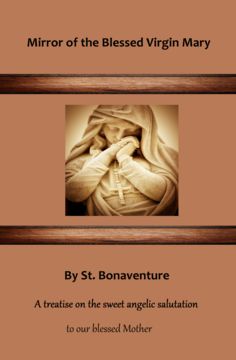
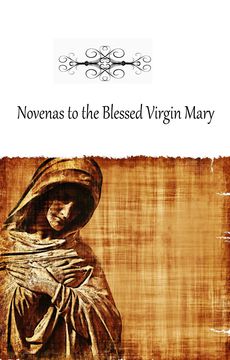
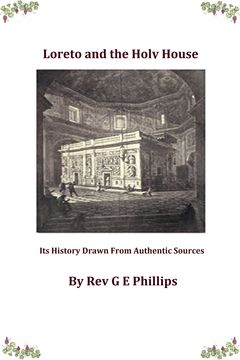


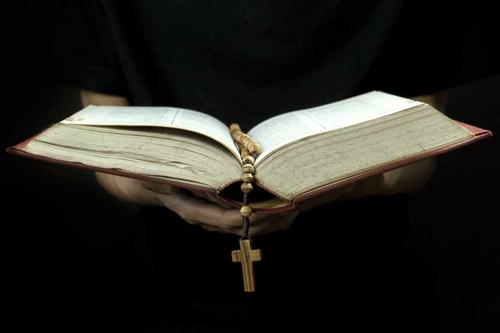



 Follow
Follow


